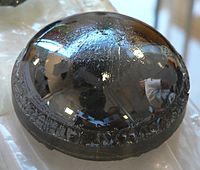
Photo from wikipedia
The present study aims to utilize rice husk as a source of silica to prepare rice husk derived silicon nanoparticles (RH-Si) and demonstrate its ability as an anode modifier in… Click to show full abstract
The present study aims to utilize rice husk as a source of silica to prepare rice husk derived silicon nanoparticles (RH-Si) and demonstrate its ability as an anode modifier in a two-chambered H-shaped microbial fuel cell (MFC). The silicon nanoparticles synthesized by magnesiothermal reduction process were spherical in shape and ranged in size from 15 to 60 nm. The anode modified with silicon nanoparticles of 0.50 mg cm-2 recorded the maximum power and current density of 190.5 mW m-2 and 1.5 A m-2 corresponding to 7.6-fold and 3-fold increase as compared to the control . The modified anode also recorded a COD removal and coulombic efficiency of 74% and 49%, respectively in MFC operated with combined distillery and domestic wastewater at a HRT and OLR of 72 h and 59.2 gCOD L-1 d-1, respectively. The results evidence that RH derived silicon NPs are good anode modifiers and effective in enhancing bioelectricity generation and COD removal in MFCs.
Journal Title: Journal of environmental management
Year Published: 2022
Link to full text (if available)
Share on Social Media: Sign Up to like & get
recommendations!